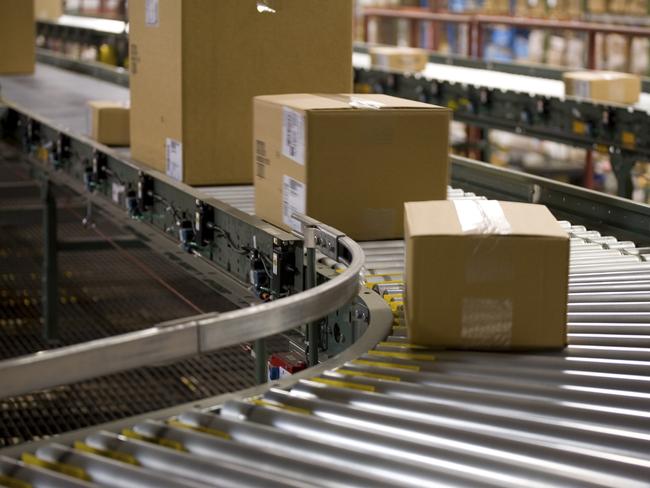Coalition ‘selling out’ to unions, retail groups in push to lower overseas online GST threshold
SUPPORTERS have slammed the Abbott government, accusing it of punishing consumers by attempting to make overseas online purchases more expensive.
COALITION supporters have hit out at the Abbott government, accusing it of abandoning its base by selling out to trade unions and interest groups in its push to lower the GST threshold for online purchases.
The government first flagged its desire to lower the $1000 GST threshold for overseas online purchases in December, with assistant treasurer Josh Frydenberg claiming local retailers were operating “with one hand tied behind their backs”.
Writing in The Australian today, Mr Frydenberg claims the Australian retail sector — which provides more jobs than any other sector in the economy — faces an uneven playing field, with the GST threshold effectively acting as a “reverse tariff”.

Under the current system, Australians pay GST on goods and services purchased from Australian retailers over the counter or online, but not those bought from overseas for less than $1000. Supporters of a lower threshold include the states and the retail industry.
“It is not fair to taxpayers, or to retailers or their many employees, to exempt overseas online retailers from the GST even if some consumers are enjoying the ride,” Mr Frydenberg says.
He claims the issue “unites politicians and unionists across the party divide”, citing former state Labor premiers and union officials in support of lowering the threshold. Mr Frydenberg says the threshold will be reviewed in the upcoming tax white paper, due early this year.
At a loss to understand why so many MPs support tax rises. Only make things more expensive for consumers and slow the economy #TaxCutsPlease
— Cory Bernardi (@corybernardi) January 5, 2015This op-ed from Josh Frydenberg is just mind-bogglingly disappointing in what it advocates http://t.co/3FEKHE4Hk1
— Trisha Jha (@themetresgained) January 5, 2015
The move has not gone down well with some of the government’s supporters, who see it as a thinly veiled tax grab. “The truth is it’s not the GST that is the issue. It’s the ridiculous rents, the electricity costs and high minimum wages that have made Australian retail shops uncompetitive,” wrote one commenter.
“Instead of dealing with those issues, Josh Frydenberg is going to pursue some good old-fashioned mercantilist policies of restricting imports with tax regulations and tariffs. Well done, Joshy.”
Another added: “Adding a 10 per cent tax to something sourced overseas that is 50 per cent cheaper than what is available locally will have two effects: 1) Nothing. 2) Cause me not to vote Liberal next time. Go and fix the economy.”

In a scathing response to today’s piece, Sinclair Davidson, Professor in the School of Economics, Finance and Marketing at RMIT and a Senior Fellow at the Institute of Public Affairs, says it represents a “betrayal of the base”.
“It’s a shocking article by Josh Frydenberg,” he said. “My question is, if the unions and the Labor politicians are the people with all the ideas, then why do we need a Liberal government?
“[Supporters] expect the Coalition government to be telling inefficient businesses to lift their game, and certainly not be engaging in protectionism or giving special privileges to unionists.”
Two reviews examining the feasibility of lowering the threshold — one by the Productivity Commission in 2011 and one by the Low Value Parcel Processing Taskforce in 2012 — found the cost of collecting the taxes would outweigh the revenue generated.

“People are going to be angry because they know the arguments the government is putting up are nonsense,” Professor Davidson said. “People don’t go online to buy stuff to avoid GST, they go online to get better prices and buy goods and services they can’t get in Australia.
“They are packaging a tax grab as a levelling of the playing field.”
Matt Levey, director of campaigns and communications at consumer group Choice, says there is an “unhealthy obsession” at the heart of the debate that “somehow if we could make people pay GST there would be a stampede back to Australian retailers”.
“We’ve had a pretty consistent position for years which is that it’s not a loophole, it’s a rational decision that you don’t charge a tax if you raise less from it than it costs to administer. It’s really a question of whether there’s going to be an overall benefit,” he said.

“You can’t just punish consumers because some sections of the retail industry aren’t competitive. You don’t solve a competition issue by making one side more uncompetitive. This idea that thousands of jobs are being lost because people don’t want to pay GST to Australian retailers is a fantasy and it’s been really unhelpful.”
According to a recent survey by Choice, only 12 per cent of people say they shop online to avoid GST or customs — the top reason given was to shop at a time that suits them, followed by convenience of having items delivered. “The overwhelming group are doing it because they can find a great bargain,” Mr Levey said.
Writing in The Weekend Australian, commentator Grace Collier was also critical of Mr Frydenberg’s comments, urging the government to “put consumers first”. “Does anyone seriously believe that putting a tax on consumer items will create jobs? All it will do is add to our already high cost of living,” she wrote.
“On a whole raft of issues — financial reforms, internet piracy, car prices, online purchases — the government is not putting consumers first, and it should be.”
Should the GST threshold for overseas online purchases be lowered? Leave your comments below or email the writer at frank.chung@news.com.au




